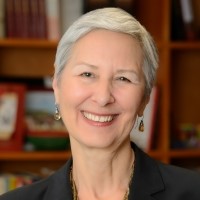Wednesday, June 24, 2020 | 4:00 PM EDT - 5:15 PM EDT
Zoom webinar |
In April 2020, reports about the poor treatment of African residents in Guangzhou were published around the world, including in the United States. COVID-19 had exacerbated the sometimes tense relationship between Africans and Chinese in China. China has invested in the manufacturing and agriculture sectors across Africa in recent decades, as well as in infrastructure development through loans, export credits, and official development assistance. What is the nature of the financing, and of the relationships between China and African nations? What does Chinese policy toward Africa mean for the United States, its bilateral relationship with China, and its relationships with the countries of Africa?
On June 24, 2020, the National Committee held a virtual program with Professor Deborah Bräutigam, one of the world’s foremost experts on China and Africa and a National Committee board member, and Ambassador Jendayi Frazer, former U.S. ambassador to South Africa and former assistant secretary of state for African affairs, to discuss China, Africa, and U.S. policy.
Below are the five key takeaways from the presentation.
- Ambassador Frazer: The President’s Emergency Plan for AIDS Relief (PEPFAR) established by President Bush in 2003 set up health care infrastructure (including community health care centers) and training (for health care workers) that are still in place, helping with African countries’ response to COVID-19.
- Professor Bräutigam: Due to COVID-19, Chinese President Xi pledged $2 billion to support health initiatives in low-income African countries, sending protective equipment, constructing hospitals, and building infrastructure (electricity and roads are critical to making health care accessible).
- Professor Bräutigam : The Chinese government ties sovereign lending to infrastructure projects, which has a stream of future revenues, to lower interest rates and reduce the risk of default. In the event of default, China asks for friendly consultation and arbitration.
- Ambassador Frazer: In addition to economic returns, China has also gained political capital by developing infrastructure projects in African countries as it expands its influence globally. China is committed to building the Africa CDC, something that the U.S. has not supported, exposing a lack of leadership.
- American and Chinese behavior in Africa:
i. Ambassador Frazer: African leaders constantly reach out to both the United States and China. There is no trade-off involved.
ii. Professor Bräutigam: China demonstrates great respect to Africa and treats African nations as long-term business partners, unlike the United States.

Deborah Bräutigam
Deborah Bräutigam has been writing about the fact and fiction of China and Africa, including state-building; governance, and foreign aid, for more than 20 years. Her most recent book, Will Africa Feed China? (2015) sheds light on the contrast between realities and the conventional wisdom on Chinese agricultural investment in Africa. She is also author of The Dragon’s Gift: The Real Story of China in Africa (2010).
Currently Bernard L. Schwartz Professor of International Political Economy, director of the International Development Program, and founding director of the China Africa Research Initiative (CARI) at Johns Hopkins University’s School of Advanced International Studies (SAIS), she has also held faculty appointments at American University, Columbia University, and the University of Bergen, Norway, and been a senior research fellow with the International Food Policy Research Institute (IFPRI) in Washington, D.C. She serves on the board of the National Committee on U.S.-China Relations.
Dr. Bräutigam has twice won Fulbright research awards. She is also a recipient of fellowships from the Council on Foreign Relations and the Woodrow Wilson International Center for Scholars. Her research and work with CARI has been funded by the German Marshall Fund of the United States, the Smith Richardson Foundation, the Bill and Melinda Gates Foundation, and the UK Centre for Economic Policy and Research (CEPR), Carnegie Corporation of New York, and the Economic and Social Research Council (ESRC). She has served as a consultant for Transparency International, the United Nations, the World Bank, DFID, GIZ, DANIDA, the African Development Bank, and USAID, and has provided commentary to the Financial Times, the New York Times, the Guardian, CNN, NPR, Al-Jazeera, VOA, CCTV, and MSNBC.
Dr. Bräutigam received her Ph.D. from the Fletcher School of Law and Diplomacy, Tufts University, and her B.A. from Ohio Wesleyan. She has also studied at the University of Kent (UK), Chinese University of Hong Kong, and Taiwan Normal University.

Jendayi E. Frazer
Jendayi E. Frazer served as the U.S. Assistant Secretary of State for African Affairs from 2005 to 2009. She was special assistant to the President and senior director for African affairs at the National Security Council from 2001 until her swearing-in as the first woman U.S. Ambassador to South Africa in 2004. She previously served in government from 1998 to 1999 as a Council on Foreign Relations (CFR) international affairs fellow, first at the Pentagon as a political-military planner with the Joint Chiefs of Staff, working on West Africa during Nigeria’s transition to civilian rule, and then as director for African affairs at the National Security Council, working on Central and East Africa.
Dr. Frazer founded a consulting and investment firm, 50 Ventures, LLC, in 2011 that helps companies navigate market entry and expansion in Africa. She is the managing partner and chairman of Africa Exchange Holdings, Ltd., a private sector company that is building commodity exchanges in Rwanda and Nigeria to provide small-scale farmers with access to storage, information, and financing to strengthen their market participation.
Ambassador Frazer is adjunct senior fellow for Africa studies at CFR. She was most recently a visiting professor at Columbia University’s School of International and Public Affairs. She was a distinguished public service professor at Carnegie Mellon University from 2009 to 2014, where she was on the faculty of Heinz College’s School of Public Policy and Management. She was also an assistant professor at Harvard University and the University of Denver. Her research focused on strengthening regional security cooperation and economic and political integration in Africa. The author of and contributor to a number of articles, journals, and books, she is the co-editor of Preventing Electoral Violence in Africa (2011).
Dr. Frazer received her B.A. in political science (with honors) and African and Afro-American studies (with distinction), M.A.s in international policy studies and international development education, and Ph.D. in political science, all from Stanford University.

